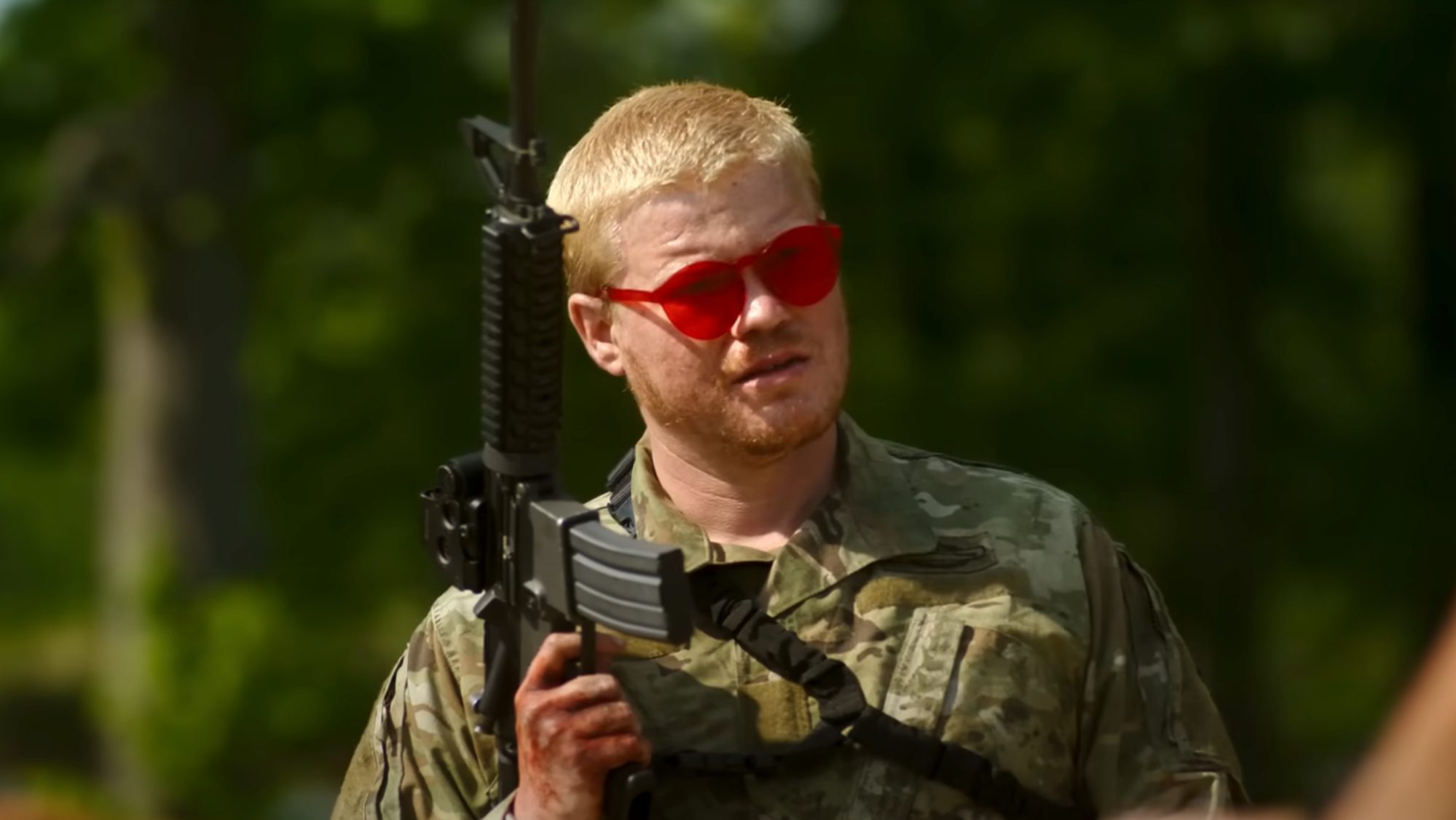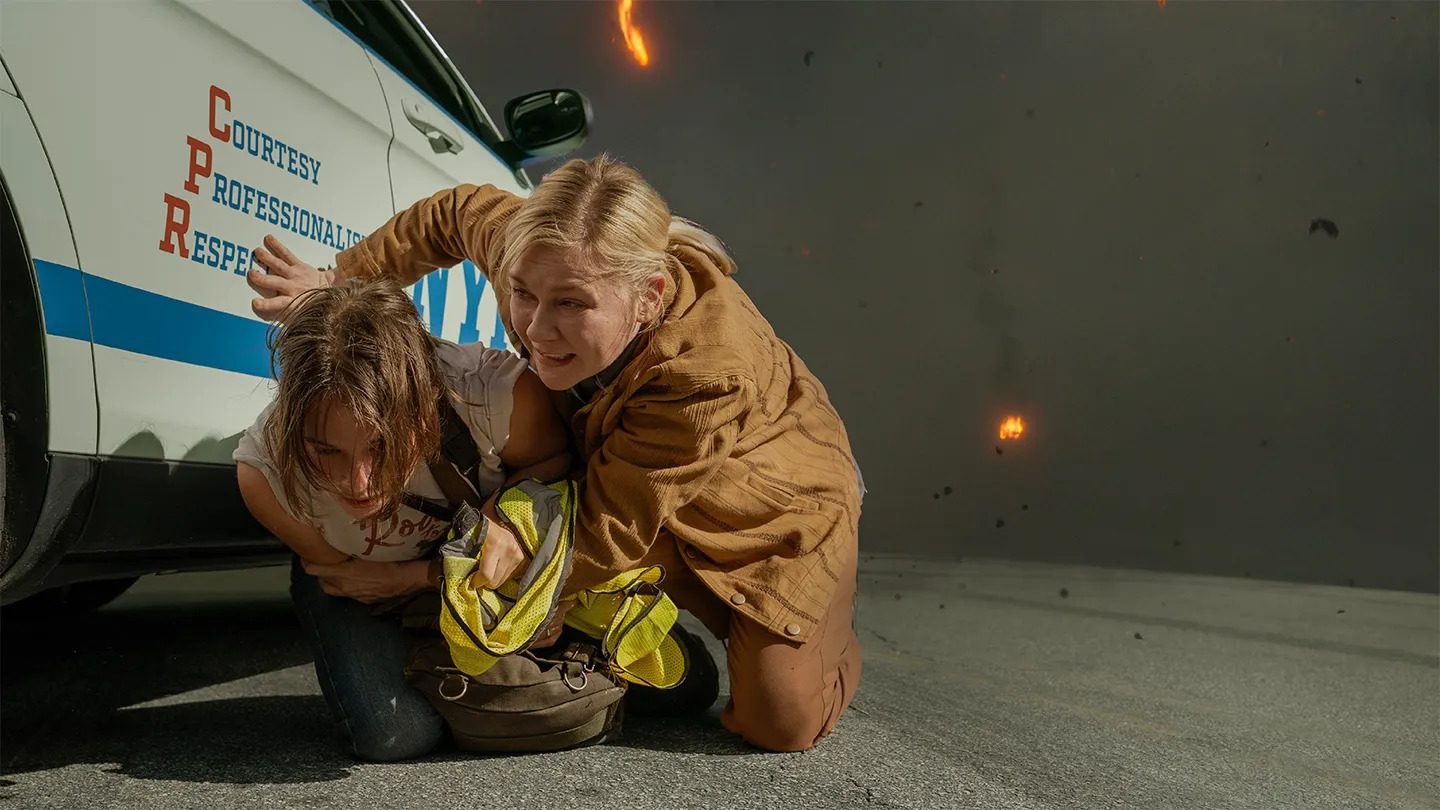REVIEW: Civil War (2024)
[Insert lack of Marvel superheroes joke here.]
Now that that’s out of the way, Alex Garland’s Civil War is a surprisingly smart movie, a film not about right and wrong so much as what would happen if a hellish civil war of the kind we mostly associate with third-world nations came to America, and the news media’s role in it. It’s the kind of film you wrestle with as you watch it, one that will frustrate you for the right reasons and get you to see… what you’ll see, really.
In an America torn apart by a civil war between a disparate bunch of factions and the federal government, reporter Lee Smith (Kirsten Dunst) brings her colleague Joel (Wagner Moura), friendly rival reporter Sammy (Stephen McKinley Henderson), and aspiring photojournalist Jessie (Cailee Spaeny) on a journey to interview the President (Nick Offerman) as opposing forces close in on Washington DC.
The biggest question everyone has about Civil War is whether it’s politically one-sided, specifically to the left. It is not. The tease in the trailers about California and Texas forming an alliance signified exactly what I and many others suspected: Civil War does not take sides and is not even about the right and left. The movie goes to great pains to make this clear, and it’s surprisingly successful. A lot of the attempts to paint itself as non-partisan work better than you’d think, and they’re quite thoughtful as well, especially when touching on current events. (Civil War takes place about twenty years in the future.) For example, something called “the ANTIFA massacre” is mentioned as having happened in the past. Did ANTIFA massacre a bunch of people, or were a group of ANTIFA members massacred? It’s not clear, and the viewer can make their own determination because either one works. The President’s party is never mentioned, and different factions are aligned with different political philosophies, both left and right. (I’ll admit to chuckling at a line about “the Maoists from Portland.”)
Since it doesn’t take political sides, Civil War could easily have drifted into meaninglessness, but it doesn’t. It’s about the fracturing of a people and what that does to a country. There are no good guys or bad guys, just lots of people who are portrayed differently in different scenes. The President is alternately a monster, the lone voice of rationality and stability, and a scared man who just wants to live through a nightmare he never imagined. The various factions are either freedom fighters opposing tyranny or a bunch of bloodthirsty savages looking for an excuse to kill. Oftentimes, you don’t know who is fighting whom, nor do the combatants, which is confusing, but with a purpose; the entire war is a mess that has blurred the lines between evil and righteousness. Some of my favorite scenes in Civil War involve those who don’t want any part of the war, who’ve carved out a slice of America for themselves and are waiting out the storm. The shifting portrayal of these folks is wonderful.

That leaves the press, whom Civil War portrays as the true heroes of war, society, and America… until it doesn’t. This really shocked me, because for much of the film, Civil War seems to celebrate reporters, even while keeping the characters human. But there are hints here and there that these guys are not all they’re cracked up to be, nor is their profession, and by the end, it says some mighty brave things about the Fourth Estate. (When I say “brave,” I mean in the current Hollywood climate, where the mainstream media is to be worshiped at all costs.) Civil War has some brave things to say about a lot of aspects of American culture, actually, and it does so with a subtlety you don’t often find in modern cinema. But that’s the rub: I’m not sure it intended to say these things. And that’s one of the many aspects of Civil War I wrestled with while watching it; I believe someone else could see the same scenes I did and take a completely different message from it. That, to me, is smart filmmaking and much more rewarding than a simple “Here’s what you’re supposed to think.”
Not all of it is smart or well-produced, however, and Civil War certainly stumbles here and there. At times, it’s too on-the-nose, which is funny in a movie that is so sly in other ways. Kirsten Dunst’s character is named Lee Smith, and she is likened (in adoring tones) to Lee Miller, a photographer during World War II who took pictures of the Dachau concentration camp. That’s a bit much, especially since it’s spelled out on screen like she’s a saint. There’s also some bad editing here and there; at one point, the narrative shifts from Lee and her team getting some sleep in their truck to suddenly being in the middle of a firefight with some other soldiers and journalists; who these people are, what they’re doing, or how Lee and friends hooked up with them is never explained. I know it’s supposed to represent how jarring being in the middle of a war would be, but it takes the confusion too far, and now, we’re just lost. There are also some questionable character decisions that, given the repercussions, are maddening. There’s a moment where the leads leave a bunch of readily available guns behind when they really need to take a gun or two, and no one with half a brain would have done that. On the other hand, there are some exceptionally strong images in Civil War, and the idea of the sort of barbaric war we’ve only seen happen on foreign soil coming to American shores is captured well, with shots of gruesome violence and atrocities that would make anyone shudder happening on your average American street.

The characters are mostly good. Kirsten Dunst is fascinating to watch if you grew up with her earlier films; she used to be known for playing chipper, smiling girly-girl types, usually in high school, and that’s the image I’ve always had of her. Even in later roles, like her stint on FX’s Fargo, she’s played up that image, if only to subvert it. She shifts gears mightily in Civil War, playing a seasoned reporter who wears the scars of the many horrors she’s seen in her jaded eyes. There’s no hint of her old persona here, just a woman tired of violence she’ll probably never know the end of, who doesn’t even remember the America of old when she’s faced with it. Stephen McKinley Henderson’s Sammy, on the other hand, is old enough to have enjoyed that America and infected enough with its promise to long to see it again. Sammy is caught between Lee’s cynicism and Jessie’s enthusiasm, and he won’t let go of either. Jessie could have been really annoying, but she’s a relatable embodiment of the naïvetée of youth who only think they know what war is. Cailee Spaeny plays Jessie as a girl who has to grow up fast, and you feel every step of her evolution. Wagner Moura’s Joel is the weak link; he’s mostly just annoying, there to make mistakes and have nervous breakdowns. And, unfortunately, Nick Offerman is barely in Civil War; he has more screen time in the trailer than he does in the movie, present mostly through radio broadcasts. As much as I like Nick Offerman, the wisdom in this is clear in the end, which I won’t spoil but which is perfect in its depiction of the small and the powerful.
I can’t recommend Civil War enough. I can’t remember the last time a movie constantly surprised me like this, challenged me in different ways than I expected, and left me with some (probably misplaced) faith that Hollywood can make more like this.
Civil War (2024)
Plot - 8
Acting - 8
Directing/Editing - 8
Music/Sound - 8
Themes - 9
8.2
Good
Civil War is a thoughtful nightmare vision of the cruelty, fear, and violence of a third-world civil war coming to America and how a nation so divided can eat itself. It has some bad editing, one extraneous and annoying character, and some too-obvious symbolism, but it’s also got some evocative imagery, good performances, and intelligent ideas and a willingness to let the audience interpret them as it will.







